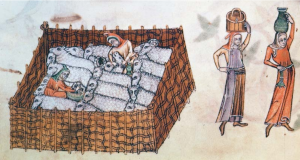‘His Eye is on the Sparrow’: Why We Matter
This is a draft of a chapter for a forthcoming book called “Why People Matter,” edited by John Kilner. I am expanding on questions and affirmations Kara Slade and I made when we gave a keynote address at the Society for the Study of Christian Ethics. That essay is online here at this site. It is thanks to Kara also that we are posting this draft here. Having worked on it for so long, I’d lost perspective on whether or not it is helpful. She says it is! And thanks so much to Meghan Florian for editing this draft and creating the bibliography! – ALH
Are not two sparrows sold for a penny? And not one of them will fall to the ground without your Father’s will. But even the hairs on your head are all numbered. Matthew 10:29-30 (RSV)
I sing because I’m happy, I sing because I’m free, For His eye is on the sparrow, and I know He watches me. Civilla D. Martin, 1905
Introduction
You and I are not only individuals. Each individual Christian is part of a larger body. We are part of the Body of Christ. But we are not “just” part of the Body. The Body of Christ cannot itself be measured or parceled. Take the Lord’s Supper as a weekly reminder of this fact of Christian faith. Christians believe the Body of Christ is indiscriminately there, on the table, across the world in ways that not even Google Maps can map. And each individual in the Body of Christ cannot be authoritatively measured or parceled or evaluated numerically. Being part of Jesus Christ means that each individual, as a whole, is whole in an incalculable way. We are each, as little bitty parts of the Body of Christ, unto our own, beloved beyond reckoning by God as individuals. Here I further suggest, with centuries of Christians, that Jesus came in one single body with a name and a history and a story for a reason. Jesus is not a “symbol” of some other truth that is beyond his particularity, whether that truth is political or spiritual or aesthetic. His individual body marks our individual bodies as known by God in ways that must shape how we seek to know one another not as symbols or instantiations of another reality but as real, as incarnate. Numbering people – and trying to know them by a category that can be counted, and assessed, and sent by experts into the right pen – is a lie that Christians need to refuse. This essay is one way to explain why the particularity of Jesus Christ matters for the particular matter that makes each person a unique person. You, and I, and that woman next to us in the pew, each one of us is too inscrutable for a larger description and decisive evaluation by another human being or another group of human beings who seek to study us. Read more





